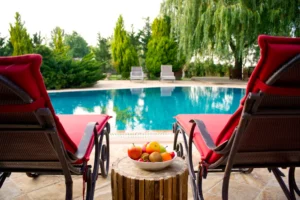 Swimming pools are often associated with relaxation, recreation, and summer fun. However, before taking the plunge and installing a pool in your backyard, it’s important to carefully consider whether it’s a good idea for you and your family.
Swimming pools are often associated with relaxation, recreation, and summer fun. However, before taking the plunge and installing a pool in your backyard, it’s important to carefully consider whether it’s a good idea for you and your family.
Whether having a swimming pool is a good idea depends on various factors specific to your circumstances and preferences. While pools offer numerous benefits, including recreation and relaxation, they also entail significant costs, maintenance requirements, and safety considerations.
Before making a decision, carefully weigh the pros and cons, and consider alternative options such as community pools or recreational facilities. Ultimately, the decision to install a swimming pool should align with your lifestyle, budget, and commitment to responsible ownership.
The Appeal of a Swimming Pool
There’s no denying the allure of having a swimming pool at home. It can provide a convenient way to stay active, entertain guests, and create lasting memories with family and friends. Additionally, a well-designed pool can enhance the aesthetic appeal of your outdoor space and increase the overall value of your property.
Considerations Before Installing a Pool
Before making a decision, it’s essential to evaluate various factors, including the size of your yard, local climate conditions, and zoning regulations. Additionally, consider how often you’ll realistically use the pool and whether it aligns with your lifestyle and budget.
Maintenance and Cost
Owning a swimming pool comes with ongoing maintenance responsibilities and associated costs. From regular cleaning and chemical treatments to equipment repairs and utility bills, the expenses can add up over time. It’s important to budget accordingly and be prepared for the financial commitment that comes with pool ownership.
Safety Concerns
Safety should always be a top priority when it comes to owning a swimming pool. Accidental drownings can occur, especially among young children and inexperienced swimmers. Installing proper safety features such as fences, alarms, and pool covers can help mitigate risks and ensure a safe swimming environment for everyone.
Environmental Impact
Swimming pools can have a significant environmental impact, particularly in terms of water consumption and energy usage. Evaporation, leaks, and frequent refilling can contribute to water scarcity, while heating and filtration systems consume electricity and contribute to greenhouse gas emissions. Implementing eco-friendly practices such as water conservation measures and energy-efficient equipment can help minimize your pool’s environmental footprint.
Adding or upgrading a pool can make any home look more attractive. If you are ready to invest in a fantastic new pool for your home in Tampa, FL, you can find more information and options for pool design and pool construction at JJB Pools and Spas.
Picture Credit: Freepik
